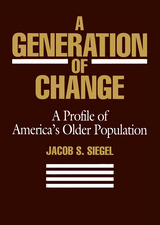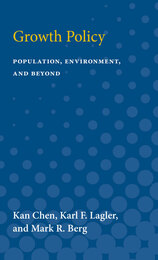108 books about Population and 2
start with G
108 books about Population and 2
108 books about Population
2 start with G start with G
2 start with G start with G

A Generation of Change
A Profile of America's Older Population
Jacob S. Siegel
Russell Sage Foundation, 1993
A Generation of Change is an exceptional study of the nation's elderly, a population that has undergone profound changes in the years since World War II. As modern medicine extends the average life span and the baby boom generation begins to approach middle age, the number of older Americans is expected to more than double in the next century. Currently, 75 percent of U.S. health care expenditures go toward the elderly. But as national trends toward early retirement and low birthrate continue, an aging American population could face crises in meeting their financial and physical needs. According to Jacob S. Siegel in A Generation of Change, astute public planning must be informed by an understanding of the demographic, social, and economic characteristics of the older population, as it is today and as it will be in the coming years. Siegel employs census and survey data from 1950 through the mid-1980s to describe a population constantly shifting in its ethnic and gender composition, geographic distribution, marital and living arrangements, health, employment, and economic status. Surprisingly, there is tremendous disparity in the quality of life among the elderly. Although their average poverty rate is below that of the general population, there are dramatic levels of poverty among older women, who are far more likely than men to live alone or in institutions. As the elderly progress from the "young old" to the "aged old"—those over 85—sharp differences emerge as income and employment decrease and degrees of chronic illness increase. In addition, residential location influences the quality of health care and public assistance available to the elderly, an effect that may account for the marked migration of older people to Florida and Arizona. Siegel analyzes the full range of characteristics for this heterogenous population and, through comparisons with other age groups as well as with the elderly of the previous decades, portrays the crucial influence of social and economic conditions over the life course on the quality of later life. With our elderly population growing more numerous and long lived, accurate information about them is increasingly essential. A Generation of Change will serve as a valuable resource for policymakers seeking more effective solutions in critical areas such as housing, long-term health care, and the funding of Social Security and retirement programs. A Volume in the Russell Sage Foundation Census Series
[more]

Growth Policy
Population, Environment, and Beyond
Kan Chen, Karl F. Lagler, and Mark R. Berg, E. Drannon Buskirk, Jr., Donald H. Gray, Karl Herpolsheimer, T. Jeffrey Jones, George Kral, J.C. Mathes, John McGuire, Donald N. Michael, Stephen M. Pollock, Ruth Rehfus
University of Michigan Press, 1974
A great deal has been said and written about pollution, overpopulation, the depletion of natural resources, and the imminence of an ecological breakdown of catastrophic proportions. The urgent questions are: What can and must be done? How can we organize our knowledge, mobilize our energies, and focus our policy planning so as to create a new relationship between man and the world in which he lives? In Growth Policy a team of experts presents a truly original, interdisciplinary approach to growth policy research from an ecosystem perspective. The authors provide an overall systems framework in which research in population, environment, and social values can be integrated and then expanded to aid the policy-decision process. The authors challenge the conventional wisdom and assumptions that underlie current policy making, and they question the ability of present political and policy-making institutions to coordinate and control the interactions among the environment, population, resource consumption, and technological development. Nor do they subscribe to the facile notion that technology alone will solve the overall problem. Instead, they propose a macrosystems approach to policy research that identifies the issues, classifies and expands the range of possible policies, uses analytical models and computer technology to compare these possible policies in terms of the overall effect desired, and finally, requires the cooperation of policy makers and researchers as well as the public at the national and international levels. This approach has the virtue of developing rational and careful planning decisions without denying the elements of subjectivity and risk involved in such decision making. It also seeks to ensure that considerations of basic human values permeate all responses to the environmental crisis. The authors argue that new concepts of life on earth, of human society and culture, and even of man himself need to be formulated if human society is to enhance
[more]
READERS
Browse our collection.
PUBLISHERS
See BiblioVault's publisher services.
STUDENT SERVICES
Files for college accessibility offices.
UChicago Accessibility Resources
home | accessibility | search | about | contact us
BiblioVault ® 2001 - 2024
The University of Chicago Press









